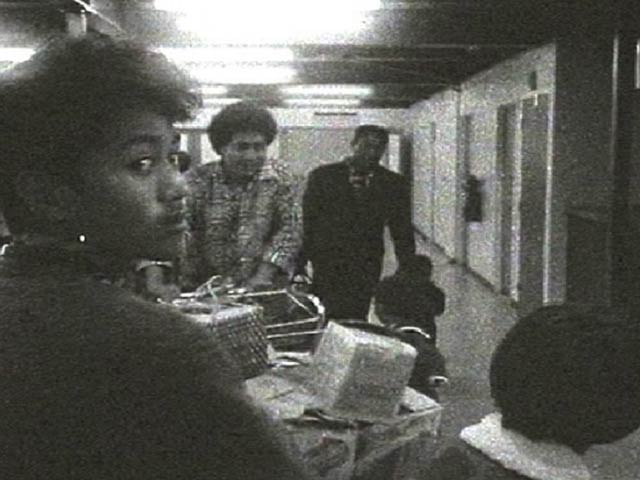Dawn Raids
Boom & Bust:
The story of the dawn raids begins in the 1950s. At the time, New Zealand's economy was doing so well, there weren't enough people to do all the work, especially in factories. So the New Zealand government looked to the Pacific, introducing system that made it easy for Pacific people to live here. Many came on temporary permits or visas, but when the labour shortage continued, the government allowed workers to stay longer. Things suddenly changed in 1973, when hard times hit around the world. In New New Zealand, unemployment became a problem - in stark contrast to the decades before - and Pacific people became scapegoats. They were blamed for the lack of jobs, and some people started using the term "overstayer".
Operation Pot Black
In 1975, a National government, led by Robert Muldoon, came to power. Muldoon was determined to address the "immigration issue". his election campaign even used a television ad that showed a Pacific-looking character getting angry because there was no work. Muldoon's plan was to find a deport overstayers, which seemed fair enough - if people were breaking the rules. But Muldoon's government didn't act fairly. At the time, around two-thirds of New Zealand overstayers were British or North American - yet by far the largest number of people to be prosecuted were from the Pacific. As well as dawn raids, Pacific people also endured "blitzes". These were random checks, in public, when the police demanded proof of residency. Pacific people were treated like criminals in front of family, friends, workmates, and neighbours, and this caused humiliation and shame. The police named this work operation Pot Black.
Raid
The first dawn raids happened in March 1974 under a Labour government led by Norman Kirk. Each raid followed the same pattern: very early in the morning, police and immigration officials would force their way into Pacific people's homes demanding paperwork. They wanted permits, visas, passports - anything that proved a person's right to be here. In the first week of the raids, around eight Pacific people were arrested. This caused a public outcry. Although some of those arrested did have expired visas, for many New Zealanders, the targeting of ethnic groups was unacceptable. They believed that the dawn raids were destroying race relations in New Zealand as well as Pacific people's sense of belonging. Most of those arrested were taken from their homes with only the clothes on their backs. They were held in police cells until they could prove their right to be here. Those who couldn't either stayed on in the cells or reported to the police each day until they were deported. some never got to say goodbye to family; others were escorted onto planes while distraught family members watched. It was a sad time that divided communities in all kind of ways, with some people dobbing in others for being overstayers.
The Apology - 1st August 2021
New Zealand's -prime minister, Jacinda Adern, has issued a formal apology for historic racist policing of Pacific people and offered scholarships to Pacific students. Hundreds of people packed Auckland town hall on Sunday to hear the apology for the "dawn raids" of the 1970s duuring which authorities hunted for visa overstayers. The practice took place under both of New Zealand's major political parties, beginning with Labour prime minister Norman Kirk and continuing under the National's Robert Muldoon.
Q & A:
What did NZ encourage during the 1950s economic boom?
During the economic boom of the 1950s, New Zealand encouraged significant migration from the Pacific region to fill labour shortages in the manufacturing and primary production sector.
In the early 1970s, when the economy fell, who was blamed by parts of society?
The migrants. The migrants who became the focal point and scapegoat for these fears were largerly Pacific peoples.
What did the government decide to do in the 1970s?
Police and Immigration officials overwhelmingly conducted raids on the homes of Pacific families.
What did Pacific communities experience?
Residents in those homes were woken abruptly, physically removed from their beds and forced into police bans to be taken for questioning. Some were hauled to the police station to appear in court the next day barefoot, in pyjamas or in clothes loaned to them in the holding cells; others were wrongfully detained.
On August 1st 2021, what did the government convey?
Jacinda Adern, the prime minister of New Zealand, has formally apologised for police crackdowns int eh 1970s gthat targeted the country's Pacific communities. Adern on Sunday told a tearful crowd gathered at the Auckland town hall that her government was offering a formal and unreserved apology for the infamous "Dawn Raids".
What do you think the Pacific Community thought and felt in the 1970s?
I think that the Pacific community felt scared and confused, because they were asked to come to New Zealand, now they are being kicked out of New Zealand. Their thoughts are probably why are the governemnt and Police treating them like that. Until 1st August 2021 I believe some Pacific people still had that anger and fear in them.
What do you think the pacific community thought and felt about the apology?
I can still imagine the Pacific community devastated and angry, especially those who experience this horrible event, but on 1st August it was a very emotional event, because it took this long for the government to response and formally apologise about the Dawn Raids.
Why did Jacinda Adern write this?
A part of the formal apology held at the event in Auckland, Jacinda Adern also wrote a article apologising online on Facebook. I believe that Jacinda Adern wrote this to formally apologise to those who were affected and to the Pacific community that couldn't make it to the ceremony due to Covid-19.
What do you think Jacinda Adern wants people to understand after reading this?
That the governemnt was to blame for this horrible event that happened in the 1970s and they are sincerely sorry.
What is Ifoga?(samoan custom) Why did Jacinda Adern participate?
The ifoga is a public act of self-humiliation accompanied by the gift of 'ie toga or fine mats. It is a formal apology in the Samoan culture. During the event we witnessed Jacinda Adern perform the ifoga, a Samoan custom of asking for forgiveness. Ifo means to bow down or lower oneself. Ifoga is when an offender covers themselves with a Samoan fien mat as an atonement for their or thier kin's wrongdoing and until the family who was affected decided to forgiver them/or that person under the fine mat they will remove the mat from them.
Images:
A image of a migrant being arrested by the police

Here is an image of pacific people arriving in New Zealand for the first time

This is a photo of the home raids in 1970.

This image means a thousand words and it brought tears to alot of Pacific Islanders. After 50 years the government has finally decided to apologise regarding the dawn raids. This photo shows Jacinda Adern participating in the ifoga (samoan custom), this shocked the Pacific community because this is the first time a prime minister has apologised through samoan traditional customs.









